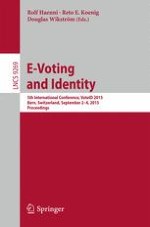2015 | OriginalPaper | Buchkapitel
Verifiable Internet Elections with Everlasting Privacy and Minimal Trust
verfasst von : Philipp Locher, Rolf Haenni
Erschienen in: E-Voting and Identity
Aktivieren Sie unsere intelligente Suche, um passende Fachinhalte oder Patente zu finden.
Wählen Sie Textabschnitte aus um mit Künstlicher Intelligenz passenden Patente zu finden. powered by
Markieren Sie Textabschnitte, um KI-gestützt weitere passende Inhalte zu finden. powered by
